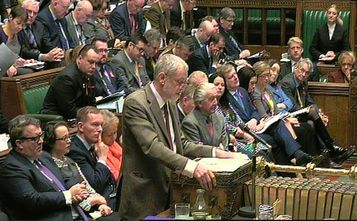|
“The question must now be whether extending the UK bombing from Iraq to Syria is likely to reduce, or increase, that threat and whether it will counter, or spread, the terror campaign ISIS is waging in the Middle East.
“With that in mind, I would like to put seven questions to the Prime Minister. “First, does the Prime Minister believe that extending air strikes to Syria - which is already being bombed by the US, France, Russia and other powers - will make a significant military impact on a campaign which has so far seen ISIS gain, as well as lose, territory? “Does he expect it will be a war-winning strategy? And why does he think other members of the original coalition - including the Gulf States, Canada and Australia - have halted their participation? “Second, is the Prime Minister’s view that the air campaign against ISIS-held areas can be successful without ground forces? “If not, does he believe that Kurdish forces or the relatively marginal and remote Free Syrian Army would be in a position to take back ISIS-held territory if the air campaign were successful? “Is it not more likely that other stronger jihadist and radical Salafist forces would take over? “Third, without credible or acceptable ground forces, isn’t the logic of an intensified air campaign mission creep and western boots on the ground? Can he today rule out the deployment of British ground forces to Syria? “Fourth, does the Prime Minister believe that UN security council resolution 2249 gives “clear and unambiguous authorisation” for UK air strikes? “And what coordinated action with other UN member states has there been under the terms of the resolution to cut off funding, oil revenues and arms supplies from ISIS in the territory it currently holds? “And in the absence of any coordinated UN military or diplomatic strategy, does he believe that more military forces over Syria could increase the risks of dangerous incidents, such as the shooting down of a Russian military aircraft by Turkish forces this week? “Fifth, how does the Prime Minister think an extension of UK bombing would contribute to a comprehensive negotiated political settlement of the Syrian civil war, which is widely believed to be the only way to ensure the defeat of ISIS in the country? “Sixth, what assessment has the Prime Minister been given about the likely impact of British air strikes in Syria on the threat of terrorist attacks in the UK? “And what impact does he believe an intensified air campaign will have on civilian casualties in ISIS-held Syrian territory and the wider Syrian refugee crisis? “Finally, in the light of the record of western military interventions in recent years, including in Iraq, Afghanistan and Libya does the Prime Minister accept that UK bombing of Syria could risk more of what President Obama called ‘unintended consequences’ – and that a lasting defeat of ISIS can only be secured by Syrians and forces from within the region?” ______________________________________________________________________ [Mr Corbyn has included a link to the above, which were his questions to David Cameron Thursday in the House of Commons after Cameron set out what he believes to be his case for UK airstrikes in Syria, in an email to party members] The email from Mr Corbyn says - "As early as next week, MPs could be asked to vote on extending UK bombing to Syria. I do not believe that the Prime Minister made a convincing case that British air strikes on Syria would strengthen our national security or reduce the threat from ISIS. When I was elected I said I wanted Labour to become a more inclusive and democratic party. So I am writing to consult you on what you think Britain should do. Should Parliament vote to authorise the bombing of Syria?"
0 Comments
|
Yourvoice
This blog will include a range of reports and opinion pieces covering many issues. It will be YOUR Voice. Archives
April 2017
Categories
All
|


 RSS Feed
RSS Feed
